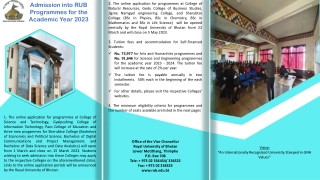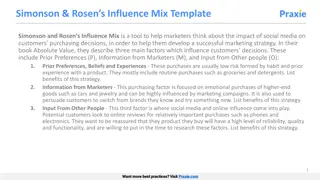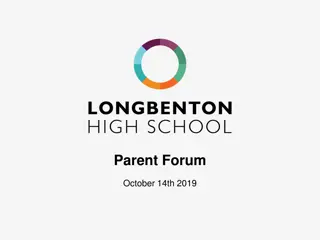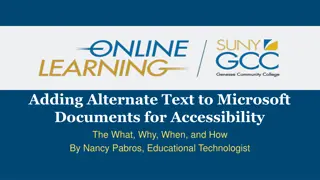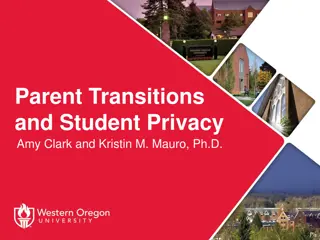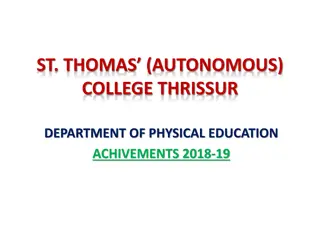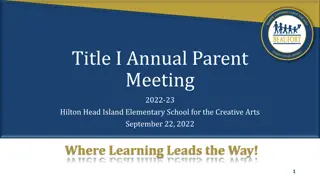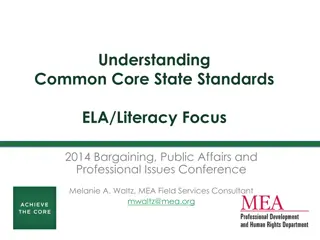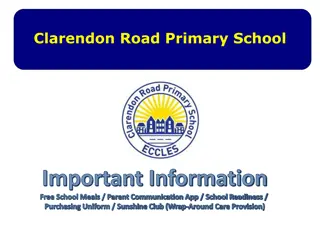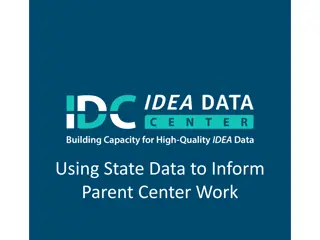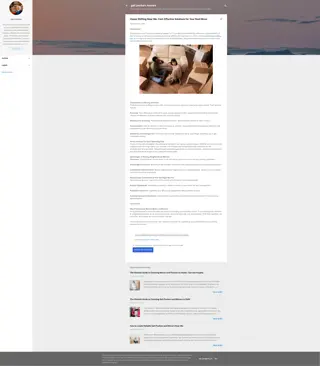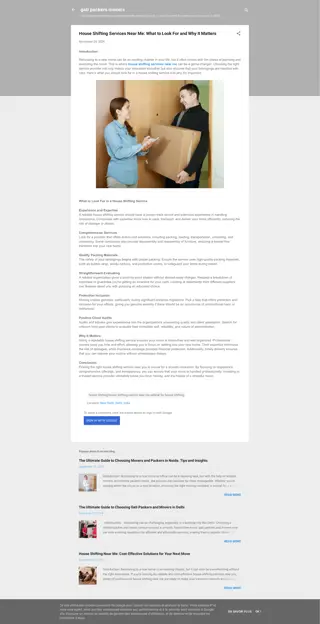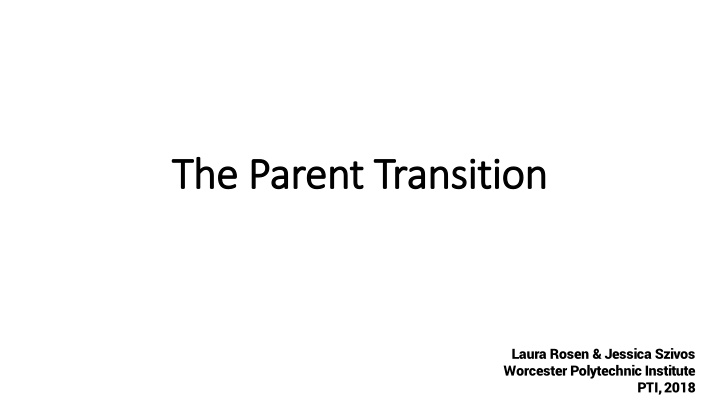
Navigating Generational Shifts in College Transition: Insights on iGen Students
Explore the impact of generational shifts on college transition, focusing on iGen students born in 1995 and later. Understand the challenges and opportunities presented by social media, mental health concerns, and parental perspectives. Delve into the origins of the iGen phenomenon and learn valuable lessons for supporting students in today's digital age.
Download Presentation

Please find below an Image/Link to download the presentation.
The content on the website is provided AS IS for your information and personal use only. It may not be sold, licensed, or shared on other websites without obtaining consent from the author. If you encounter any issues during the download, it is possible that the publisher has removed the file from their server.
You are allowed to download the files provided on this website for personal or commercial use, subject to the condition that they are used lawfully. All files are the property of their respective owners.
The content on the website is provided AS IS for your information and personal use only. It may not be sold, licensed, or shared on other websites without obtaining consent from the author.
E N D
Presentation Transcript
The Parent Transition The Parent Transition Addressing the shift in roles as students with disabilities start their college journey Laura Rosen & Jessica Szivos Worcester Polytechnic Institute PTI, 2018
Agenda Generational Shift Students Parents WPI Model ODS Early Move-in Program Data Lessons Learned Open Floor Tips from the audience
Student perspective I d literally spent some of my weekend nights at home online. I d have a couple of beers, open instant messenger, and download umpteen punk rock classics online for me that was quite a good night. I d kept talking to people I d previously knew from high school instead of getting out of my room and making an effort to meet more people. I was quite apathetic. It s just so easy to get lost in it. I d hear the ding or door opening sound and then have to see who is online. And now people have these elaborate Facebook profiles, youtube, and blogs. Be careful not to live your life online. (Cohen, 2013)
So what is iGen? Born in 1995 and later Always had cell phones Use of social media Always had the Internet
The Generational Shift: Student Social Media & Mental Health Creating feelings of inadequacy Most severe mental health crisis in decades Less face to face time Societal Shift Employment Virtual Friends College home environment Parental Involvement Stay children longer #Adulting Tracking kids
Possible Model for Origin of iGen Loneliness Dir. of Engineering More screen time = Less in-person interaction = More loneliness North America Lead Asia Lead Europe Lead Front End Lead Back End Lead Twenge, Jean. (2017) Igen: Why Today s Super-Connected Kids Are Growing Up Less Rebellious, More Tolerant, Less Happy and Completely Unprepared for Adulthood* and What that Means for the Rest of Us. New York, NY: Atria Books. (pgs. 96-97)
Parent perspective During the weeks before his son s departure, the father of a Lawrence University freshman had been trying to console his wife, who was having a difficult time. He repeatedly told her that she should focus on the positive aspect of the upcoming event, that they had been preparing their son for this day for eighteen years and now it was time for him to leave. He urged her to think of this as a time of celebration, for after all, they had a terrific son who was going off to a fine school. It was all very logical. But after they dropped their son off at Lawrence and were heading back home on the interstate, his wife looked over at him and noticed his tear-streaked face. (Coburn & Treeger, 2016, p. 213)
Generational Shift: The Parent They are coming from a place of caring Solving problems is an important skill. College can be uncomfortable. Mixed messages Grade shock: high school vs. college. Setting expectations. Guiding students who see things in black and white Response based on parents. Understanding choices.
Agenda Move-in 9:00-11:00am - Key pick-up 9:00-12:00pm - Move-in Lunch 12:00-1:00pm Morgan Dining Hall ODS Programming 1:00-1:30pm - Mentor Q&A 1:30-2:30pm - Breakout sessions 2:30-3:00pm - College strategies and tips 3:00-3:30pm - Accessing academic accommodations Unpack/Dinner (on own) Explore campus, settle into room Dinner on own.
Student Interview Question 1 What advice do you have for incoming first- year parents?
Be available to talk about things. Let them be angry about things as long as they aren t disrespectful. Let them know what failing feels like If they have a problem let them talk about it and let them finish even if you have something to say.
Student Interview Question 2 Did you use support in your first year? Was it hard to ask for help?
Yes, I used the Office of Disability Services a lot my first year. They were caring and gave me the support I needed to succeed when away from home. No, it was not hard to ask for help at all! They always have an open door and are eager to help any way possible. It s just a matter of understanding the resources available. I wasn t as informed as I wanted to be on the resources. Knowing the people to talk to.
Importance of Self-Advocacy What the Best College Students Do by Ken Bain I should say right now that this is not about people who made the highest grades in college We wanted to know how people did after they left school, [who] became those highly productive individuals who continued to grow and create. (Bain, 2012, pp. 5-6) Chapters include: Manage themselves Learn how to embrace failure Deal with messy problems Give self-encouragement Curious, seek endless education Make the hard choices
Partnering to support their student Parent s role historically Involvement in accommodations Assistance with executive functioning Gaining trust Not knowing if you will have their student s best interest at heart Understanding the office s approach to supporting students Providing Tools Parents may call because they don t know the appropriate referrals Reinforcement of campus resources from parents.
Parent Feedback Survey The topics were helpful 70% Strongly agree 30% Agree I learned something new. 56% Strongly agree 44% Agree General feedback This was very helpful. We got clarity about the supports available. Thank you! Planner is awesome! Keep the taped interviews. More time for Q&A. Very good program, thank you! Possible handout with resources for the future. Very helpful. This was great! Thank you very much.
Data Did our overall parent inquiries decrease? No Parent Inquiry Comparison 2016-17 2017-18 Total Number of Parents Inquiries 39 45* Attended Early Move-in 22 25* Didn t Attend Early Move-in 17 20* *Data collected through C-term only.
But Did the conversations focus more on self advocacy? Yes! Comparison of Conversations on Self-Advocacy 2016-17 2017-18 Percentage of conversations focused on student-advocacy 33.33% 40.00% Attended Early Move-in 27.27% 60.00% Didn t Attend Early Move-in 41.18% 15.00%
ODS Early Move-in Data 100 % Accommodation Letters submitted (all terms) 75% Felt Comfortable Asking for Help
What did you learn the most about yourself in your first year? I worry too much about grades and not enough about managing my stress. How to make sure that I don't let work build up for too long, but do it in pieces over the duration of the given time. I learned to handle my mental health better. I work best with my time organized. I also learned that it's okay to take a little time to relax from time to time.
Lessons Learned and Tips Not speaking with parents at all creates more conflict Instead, set boundaries with students and parents. They haven t developed trust in you (yet). Try sharing personal experiences, resources, & parent articles. It can be time consuming to coordinate up front. But it can save a lot of time later in the year.
Any tips and/or success you can share with the Any tips and/or success you can share with the group? group?
References Anderson, N. (2016). Analysis | As drop-off looms, a professor's note for new college parents. Retrieved July 28, 2017, from https://www.washingtonpost.com/news/grade-point/wp/2016/07/18/as-drop-off-looms-a- professors-note-for-new-college-parents/?utm_term=.41be4992199a Bain, K. (2012). What the best college students do. Cambridge, MA: Belknap Press of Harvard Univ. Press. Coburn, K. L., & Treeger, M. L. (2016). Letting go: A parents guide to understanding the college years (6th ed.). New York, NY: William Morrow, an imprint of HarperCollins. Cohen, H. (2010). The happiest kid on campus: A parents guide to the very best college experience (for you and your child). Naperville, IL: Sourcebooks. Harke, B. (2013). New College Parents: Lost in the Transition. Retrieved July 28, 2017, from http://www.huffingtonpost.com/brian-harke/new-college-parents-lost-_b_3751621.html# Twenge, J. (2017). Why Today s Super-Connected Kids Are Growing Up Less Rebellious, More Tolerant, Les Happy and Completely Unprepared for Adulthood* and What that Means for the Rest of us. New York, NY: Atria Books.
Thank you! Thank you! WPI Office of Disability Services 508-831-4908 disabilityservices@wpi.edu www.wpi.edu/+disabilities Laura Rosen, Director lrosen@wpi.edu Jessica Szivos, Assistant Director jlszivos@wpi.edu

